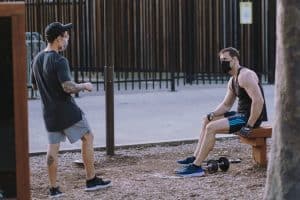Perhaps our most powerful tool when dealing with stigma is sharing our lessons learned. Whether we face public stigma or our own self-stigma, we can always choose how we respond and when.
PUBLIC STIGMA: What Works for Us

Public stigma can either be very subtle or completely in your face. There are many ways to respond to it – whether it’s directed at you or directed at others. We asked people with lived experience who had faced stigma in a public setting, what happened and how you handled it? What advice would you give to someone on how to respond to an experience like yours? What worked for you?
Start a Conversation
“
“When we say “meet them where they are”, I don’t think that just applies to people who are being pushed down by stigma, I think it also applies to those furthering stigma. I believe stigma is fed by fear and dehumanizing experiences. To dismiss fear and dehumanize people in the process of addressing stigma seems to only make problems worse. I have these conversations with university staff and administrators who say, “We don’t have THEM here”, or who say that they would never need naloxone on their campus. Or when they ask, “Why would we want a bunch of junkies gathering on campus?” So, it’s become a real skill to take a second, breathe, and trust that we all have hearts just waiting to be acknowledged. So, honestly, I have started treating everyone like I wish we would treat those in active use or seeking recovery. I feel that it’s led me to be a better person in general.”
Choosing to Speak Up:

“Physical disability often comes with stigma. When interacting with a vendor, waiter, interviewer, etc., countless times I have experienced and witnessed the person with a disability being ignored or glossed over. The stigma is that a person with a disability is not as capable to think, act, or answer for themselves. Not true.
When that happens, I speak up and make my voice and opinions known. Depending on the situation, I might even ask the person I’m interacting with, why they didn’t directly interact with me. Turn it into a non-confrontational teachable moment.”
It’s Okay to Step Back

One day you will share your story of how you overcame what you went through, and you will be someone else's survival guide.”

SELF STIGMA: What Works for Us

Reality Check
“
Find Your Voice

“I often tell people that stigma killed our daughter. I really didn’t care what other people thought, but I think it affected how we responded to her and it somewhat blinded all of us. There were so many things that we didn’t see with our daughter when they were happening, and the unfortunate truth is that I think in a way we didn’t want to see them. By the time we did and realized she needed a long-term treatment program, it was really too late. It was only a couple of months before her fatal overdose. 
Learn, Listen, and Remember
“I grew up around people who used drugs, and some of those people were being actively investigated (and later put in prison) by parents of my friends. Growing up in a small town, it’s hard not to see the experiences of your family members (who use drugs, participated in the drug trade, and were incarcerated) as a giant red X on your back at every point in your life. I spent a lot of time as a young adult just hoping that teachers, coaches, employers, etc, wouldn’t recognize my last name. 
LEARN MORE:
SAFE: What No Shame Means to Me
VA: Ending Self-Stigma for Veterans
NAMI: The Many Impacts of Self-Stigma
CDC: COVID-19 and Reducing Stigma
TEDxDUKE: The Enigma of Stigma
Healthline: 5 Tips for Overcoming Medication Stigma with Type 2 Diabetes
Michigan Daily: “They Did Not Mean Me When They Said Disabled”
ZOCALO Public Square: To End the Stigma Around America’s Poverty Crisis, Teach It in the Classroom

